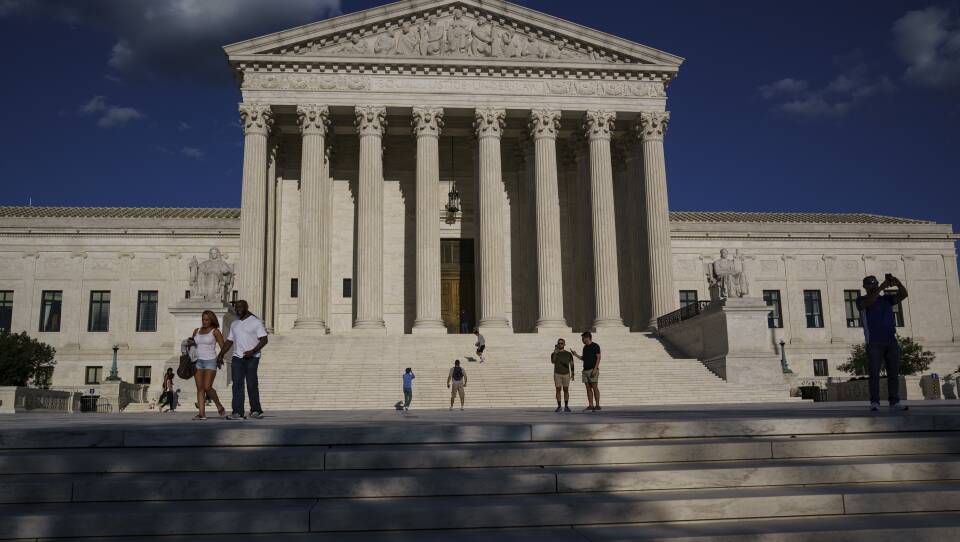The Supreme Court on Thursday gutted so-called “affirmative action” – the direct consideration of race as a factor in college admissions – and upended more than 40 years of legal precedent.
The landmark ruling is expected to make the nation’s elite campuses less racially diverse, experts said, noting declines in Black and Latino students at public colleges in states that have already enacted bans on race in admissions.
The court’s 237-page majority ruling said Harvard University and the University of North Carolina at Chapel Hill, both discriminated against Asian-American applicants by holding them to higher academic and personal standards than other students in the admissions process.
“Both programs lack sufficiently focused and measurable objectives warranting the use of race, unavoidably employ race in a negative manner, involve racial stereotyping, and lack meaningful endpoints,” Chief Justice John Roberts wrote in the ruling. “We have never permitted admissions programs to work in that way, and we will not do so today.”
Roberts added that nothing in the ruling prohibits universities from considering “an applicant’s discussion of how race affected his or her life, be it through discrimination, inspiration, or otherwise.”
That means the Court will allow applicants to mention their racial identity and experiences in admissions essays or interviews and that colleges may take those narratives it into account when making decisions.
“It’s cold comfort,” said Lee Pelton, the former president of Emerson College who earned his PhD from Harvard. “A student who can throw a football 50 yards or shoot a shot behind the three point line or who is an expert tennis player, or whose parents promise philanthropic support can be considered in an admissions process - all of them [count as factors], except one: Race.”
The plaintiffs in the case, a group called Students for Fair Admissions, welcomed the high court’s decision. Led by conservative legal strategist Edward Blum, a longtime opponent of race considerations in decision making of any kind, the group claimed Harvard and UNC held Asian-American applicants to higher standards. That included giving Asian-American prospective students lower rankings on intangibles, such as courage, kindness and leadership.
This “marks the beginning of the restoration of the colorblind legal covenant that binds together our multi-racial, multi-ethnic nation,” Blum wrote in a statement after the ruling. “The polarizing, stigmatizing and unfair jurisprudence that allowed colleges and universities to use a student’s race and ethnicity as a factor to admit or reject them has been overruled … These discriminatory admission practices undermined the integrity of our country’s civil rights laws.”
More National News
Civil rights activists and college leaders saw the initial lawsuit as a backdoor attack on race-conscious admissions, decisions that have been affirmed by judges and courts since 1978 when the US Supreme Court found the practice to be constitutional if carefully done.
In and out of court, Harvard denied the discrimination charges, saying Asian-Americans now account for nearly 30 percent of all admitted students and that its holistic admissions approach is constitutional.
“Nobody wants to be judged on their numbers alone,” Harvard president Larry Bacow said in an interview following the decision, in defense of race-conscious admissions. “People understand and recognize that we learn from our differences — that creating a diverse learning environment enriches the learning experience for every student on campus.”
In an open letter to the campus community, he and other Harvard leaders said the college would comply with the decision while continuing to support “the fundamental principle that deep and transformative teaching, learning, and research depend upon a community comprising people of many backgrounds, perspectives, and lived experiences.”
“That principle is as true and important today as it was yesterday,” the letter said. “In the weeks and months ahead, drawing on the talent and expertise of our Harvard community, we will determine how to preserve, consistent with the Court’s new precedent, our essential values.”
Other college presidents in Massachusetts said they were also disappointed with the outcome, but not surprised by the decision. Vincent Rougeau, president of the College of the Holy Cross in Worcester (as well as Supreme Court Justice Clarence Thomas’ alma mater), said he took a bit of consolation in the fact that the court will allow colleges to consider a students’ racial identity if they bring it up in an essay or interview.
“I hope students who are interested in doing that will do that,” said Rougeau, the first Black person to lead the Jesuit institution in Worcester. “Beyond that, though, I think, the onus will be on us, particularly at these more competitive and elite institutions, to get the word out to students in all kinds of communities that we want them here and we want them to apply.”
A GBH News poll conducted in 2018, however, found a vast majority of Americans — 72 percent — disagreed with the consideration of race in college admissions. Still, nine in ten said they value racial and ethnic diversity on campuses.
In 2019, a federal judge sided with Harvard, ruling its admission office does not discriminate against Asian-American applicants. In her decision, Judge Allison Burroughs quoted author Toni Morrison, saying “race is the least reliable information you can have about someone.”
Morrison’s words, Burroughs wrote in her conclusion, had to “become accepted and understood before we close the curtain on race-conscious admissions.”
Blum and his group appealed that decision all the way to the Supreme Court.
Last fall, conservative justices led by Justice Clarence Thomas, raised skeptical questions from the bench about the “educational benefits” of diversity initiatives and the real meaning of “diversity” on campus.
“I don’t have a clue what it means,” Thomas said. “It seems to mean everything for everyone.”
Thomas, who benefited from a race-conscious admissions program when he was recruited by the College of the Holy Cross in Worcester, commented broadly on the case in rare remarks from the bench.
“When a parent sends a kid to college, they don’t necessarily send them there to have fun or feel good or anything like that,” Thomas said. “They send them to learn physics or chemistry or whatever they’re studying.”
Thursday’s decision overrules the landmark 1978 Regents of the University of California v. Bakke decision, which said that colleges may consider race as one factor among other factors in admissions. That ruling also upheld Harvard's admission process as the gold standard that became a model for hundreds of highly selective schools across the country.
But since then, nine states have also banned race-conscious admissions: Arizona, California, Florida, Idaho, Michigan, Nebraska, New Hampshire, Oklahoma and Washington.
Those states have also seen declines in the percentage of Black, Hispanic and Native American high school graduates accepted to those states’ large public universities.
After voters in California banned the consideration of race in public college admissions back in 1996, selective universities including Berkeley and UCLA saw the percentage of Black and Hispanic students plummet immediately.
At UCLA, for example, the percentage of Black students fell by more than half from 7 percent to about 4 percent within two years.
Brookline resident Swan Lee, who is Chinese and co-founder of the Asian American Coalition for Education, celebrated the Supreme Court’s decision as a win for fairness.
“What we oppose is dividing people into a few racial groups and giving one specific group some kind of group-favorable treatment,” she said in an interview. “A majority of my organization's supporters are first-generation immigrants and naturalized citizens, so we really feel this is a first-hand experience of the American Dream of equal rights coming true.”
On Harvard’s campus today, some students said the ruling was a devastating loss.
Elyse Martin-Smith, chair of Harvard's Black Students Association, feared the end of affirmative action at colleges could have a wider chilling effect.
“I think it not only affects college communities,” the junior from Vermont said. “It's also impacting our communities at large, and access to education, especially for students of color, is at risk."
Amber Houghton, a recent graduate of Harvard’s Extension School, said the change to admissions is premature in a country still reckoning with deep racial inequities.
“Society is still so messed up that we are absolutely not ready for that,” Houghton said. “We still have systemic racism and oppression at all levels before people come to college. Until we change that, we are going to have to adjust what we do in order to make up for that.”
Editor’s note: Lee Pelton and Vincent Rougeau are on GBH’s Board of Trustees.









